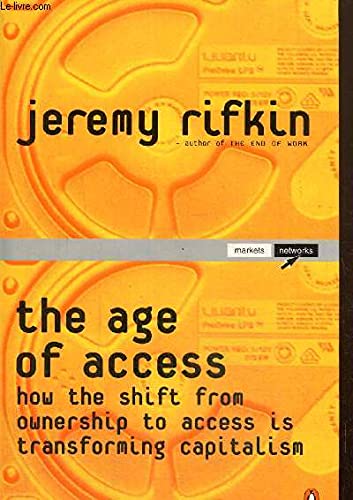The Age of Access: How the Shift from Ownership to Access is Transforming Modern Life (Penguin Business Library) - Hardcover

Synopsis
British consumers are now spending more on leisure activities than food. Businesses are freeing themselves of costly property and stock-holdings, as intellectual property becomes their most valuable asset. Culture is replacing industry as the maindriving force of the economy. Against this background, The Age of Access looks at how and why we are spending more and owning less. It explores the shift from markets to networks, geography to cyberspace, ownership to access relationships and industrial to cultural production. The critical question posed by Rifkin is whether civilization can survive when only the commercial sphere remains the arbiter of human life.
"synopsis" may belong to another edition of this title.
About the Author
An internationally renowned social critic, Jeremy Rifkin is the best-selling author of The End of Work and The Biotech Century, both of which have been translated into fifteen languages. Rifkin is a fellow at the Wharton School Executive Education Program, where he lectures on new trends in science and technology and their impacts on the global economy, society and the environment for CEOs around the world. He is president of the Foundation on Economic Trends in Washington D.C.
"About this title" may belong to another edition of this title.
Other Popular Editions of the Same Title
Search results for The Age of Access: How the Shift from Ownership to...
The Age of Access: How the Shift from Ownership to Access Is Transforming Modern Life (Penguin Business Library)
Seller: Reuseabook, Gloucester, GLOS, United Kingdom
Hardcover. Condition: Used; Very Good. Dispatched, from the UK, within 48 hours of ordering. Though second-hand, the book is still in very good shape. Minimal signs of usage may include very minor creasing on the cover or on the spine. Seller Inventory # CHL10454608
Age Of Access
Seller: Kennys Bookstore, Olney, MD, U.S.A.
Condition: Very Good. 2000. Hardcover. Very good copy in good dustwrapper. DW has minor shelf wear, remains very good. . . . . Books ship from the US and Ireland. Seller Inventory # KCW0012977
Age Of Access
Seller: Kennys Bookshop and Art Galleries Ltd., Galway, GY, Ireland
Condition: Very Good. 2000. Hardcover. Very good copy in good dustwrapper. DW has minor shelf wear, remains very good. . . . . Seller Inventory # KCW0012977
The Age of Access: How the Shift from Ownership to Access Is Transforming Modern Life (Penguin Business Library)
Seller: Greener Books, London, United Kingdom
Hardcover. Condition: Used; Very Good. **SHIPPED FROM UK** We believe you will be completely satisfied with our quick and reliable service. All orders are dispatched as swiftly as possible! Buy with confidence! Greener Books. Seller Inventory # 4964166
The Age of Access: How the Shift From Ownership to Access is Transforming Capitalism
Seller: PsychoBabel & Skoob Books, Didcot, United Kingdom
Hardcover. Condition: Very Good. Dust Jacket Condition: Very Good. Hardcover with unclipped dust jacket, in very good condition. Jacket edges are creased. Board corners and spine ends are bumped. Ink and pencil marginalia noted on some of the pages, and several pages are dog-eared at the upper edge. Pages are otherwise clear and binding is sound. LW. Used. Seller Inventory # 547040
The Age of Access: How the Shift from Ownership to Access is Transforming Mod.
Seller: madelyns books, Suffolk, United Kingdom
Condition: Used: Very Good. Ex library so some stamps etc. VERY GOOD CLEAN COPY/LIKE NEW. . SENT NEXT WORKING DAY FROM THE U/K 1ST CLASS 0.0. Seller Inventory # 1106H876677
Le age of access - How the sphift from ownership to access is transforming capitalism
Seller: Le-Livre, SABLONS, France
Couverture rigide. Condition: bon. RO80245676: 2000. In-8. Relié. Bon état, Couv. convenable, Dos satisfaisant, Intérieur frais. 312 pages. Jaquette en bon état. Texte en anglais. Avec Jaquette. . . Classification Dewey : 420-Langue anglaise. Anglo-saxon. Seller Inventory # RO80245676
The Age of Access: How the Shift from Ownership to Access is Transforming Capitalism (Penguin Business Library)
Seller: Studibuch, Stuttgart, Germany
hardcover. Condition: Gut. 312 Seiten; 9780140296129.3 Gewicht in Gramm: 1. Seller Inventory # 827688
The Age of Access: How the Shift from Ownership to Access Is Transforming Modern Life (Penguin Business Library)
Seller: medimops, Berlin, Germany
Condition: good. Befriedigend/Good: Durchschnittlich erhaltenes Buch bzw. Schutzumschlag mit Gebrauchsspuren, aber vollständigen Seiten. / Describes the average WORN book or dust jacket that has all the pages present. Seller Inventory # M00140296123-G

